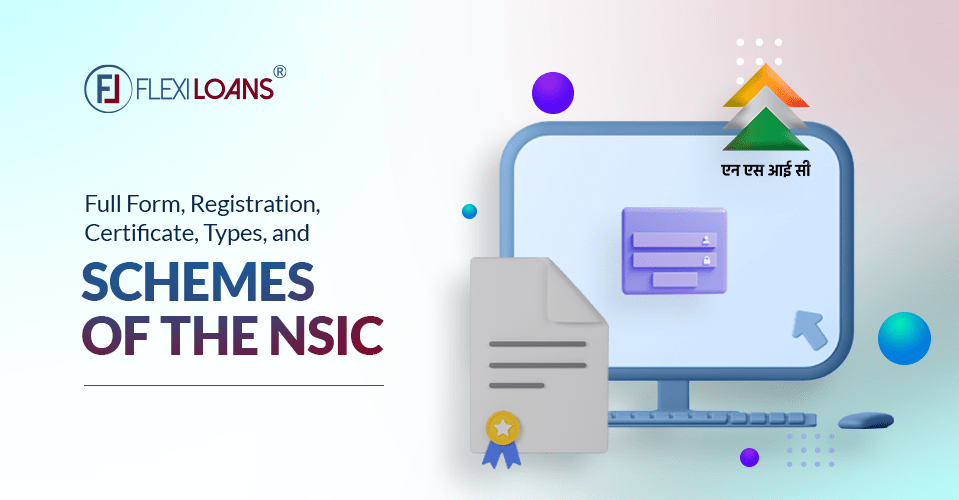Mar 03, 2025
Sep 21, 2025

NSIC stands for National Small Industries Corporation Limited, is a government-backed institution that supports Micro, Small, and Medium Enterprises (MSMEs) in India. With the growing importance of small businesses in India’s economy, NSIC helps MSMEs access financial assistance, raw materials, and government tenders.
What is NSIC?
The Government of India founded the National Small Industries Corporation (NSIC) in 1955 to address the critical challenges that Micro, Small, and Medium Enterprises (MSMEs) face. Unlike large corporations, MSMEs struggle with limited financial resources, restricted market reach, lack of access to raw materials, and difficulties in securing government contracts. To bridge these gaps, the government established NSIC as a specialised institution that enables small businesses to thrive, compete, and expand.
At the time of its formation, India’s economy was undergoing industrialisation, but small businesses lacked institutional support. Traditional banks were reluctant to lend to them due to the perceived risks, and they faced high costs for raw materials and marketing. The government recognised that MSMEs play a pivotal role in job creation, innovation, and exports. To ensure their growth, NSIC came up with a clear mission:
- Facilitate easier access to credit and financial aid
- Support MSMEs in scaling their operations
- Provide them with affordable procurement options
- Enable their participation in government projects
The Core Reasons Behind NSIC’s Establishment
1. Strengthening MSME Financial Stability
Small businesses often lack collateral and credit history, which makes it difficult for them to secure loans. To address this issue, the government created NSIC to:
- Bridge the financing gap by offering financial assistance schemes.
- Collaborate with banks and NBFCs (like FlexiLoans) to provide collateral-free business loans.
- Encourage credit rating for MSMEs, making them more eligible for funding.
Without such support, many small businesses would fail to scale due to financial constraints.
2. Encouraging MSME Participation in Economic Growth
India’s industrial policies in the 1950s focused on large-scale industries, leaving MSMEs with fewer opportunities. NSIC was set up to:
- Integrate small businesses into the larger economic framework.
- Help MSMEs access national and international markets.
- Ensure that government procurement policies favor small businesses.
By doing this, the government aimed to balance economic growth between large corporations and small enterprises.
3. Overcoming Procurement & Supply Chain Challenges
Raw materials account for a significant portion of MSME expenses. Without bulk purchasing power, small businesses often pay higher prices and struggle with supply shortages. The government tasked NSIC with:
- Sourcing essential materials in bulk to provide them at lower rates to MSMEs.
- Ensuring a stable supply chain for small-scale manufacturers.
- Reducing dependency on import-based raw materials.
This step was crucial in making MSMEs more competitive in pricing and production.
4. Simplifying MSME Access to Government Contracts
Before NSIC, small businesses had little to no participation in government projects due to:
- Complicated bidding processes
- High security deposits
- Limited awareness of tender opportunities
Government established NSIC to remove these barriers by:
- Exempting MSMEs from Earnest Money Deposits (EMD) and security deposits.
- Creating the Single Point Registration Scheme (SPRS) for hassle-free government tender participation.
- The government reserves a percentage of procurement for MSMEs.
This policy opened new revenue streams for small enterprises, allowing them to work with public sector companies and government departments.
5. Promoting MSME Growth Through Market Expansion
Lack of visibility and marketing budgets prevented MSMEs from expanding beyond local markets. NSIC was formed to:
- Provide a platform for MSMEs to showcase their products.
- Facilitate participation in domestic and international trade fairs.
- Encourage networking through buyer-seller meets.
This helped small businesses expand their customer base, generate more revenue, and establish brand recognition.
NSIC Registration – Who is Eligible?
To register with NSIC, businesses must meet certain criteria.
Eligibility Criteria:
- MSMEs must be registered under Udyam Registration (previously Udyog Aadhaar).
- Businesses engaged in manufacturing, trading, or service sectors can apply.
- The enterprise should have a sound financial track record.
- Startups and new businesses can apply if they meet the criteria.
Validity of NSIC Registration
- NSIC registration is valid for 2 years.
- MSMEs must renew it before expiry to continue availing benefits.
Pro Tip: Renewal ensures that MSMEs stay eligible for government tenders and financial aid without disruptions.
How to Apply for NSIC Registration? (Step-by-Step Guide)
Step 1: Visit the NSIC Website
- Go to the official NSIC portal: www.nsic.co.in.
Step 2: Download the Application Form
- Select the appropriate NSIC registration form.
Step 3: Fill the Form & Gather Required Documents
- Enter business details and attach the necessary documents.
Step 4: Pay the Registration Fee
- The fee depends on MSME turnover and business category.
Step 5: Submit the Application
- Send the completed form online or to an NSIC branch.
Step 6: Verification & Approval
NSIC verifies the details and, upon approval, issues an NSIC certificate.
NSIC offline registration
Step 1: Download a copy of the NSIC Registration Application Form.
Step 2: Fill in the required details.
Step 3: The micro, small, and medium enterprises have to submit the reports to the Zonal/ Branch office, and essential charges are to be paid to the Sub Office/Extension office of NSIC.
Step 4: Another form has to be filled out at the inspection office. This process has a deadline so that the Inspection agency can do the technical inspection of the MSME premises.
Step 5: After generating the inspection report, the National Small Industries Corporation issues the MSME a registration certificate.
Documents Required for NSIC Registration
Businesses need to submit the following documents:
- MSME Udyam Registration Certificate
- PAN Card & Aadhaar Card of the owner
- Business Address Proof (Electricity Bill, Rent Agreement, etc.)
- Audited Financial Statements (for the last two years)
- List of products or services provided by the MSME
- Copy of GST registration certificate
- Bank statement for the past six monthsEnsuring complete and accurate documentation speeds up the approval process.
NSIC Registration Charges
NSIC full form in entrepreneurship is National Small Industries Corporation. NSIC Registration charge is based on turnover. Inspection charges are paid in addition to the registration fee. The fee structure of MSMEs is given below:
| Category | Fee |
| Upto Rs. 1 cr turnover | For small enterprises: Rs. 5000 For micro enterprises: Rs. 3000 |
| More than Rs. 1 cr turnover | For small enterprises: Rs. 5000 plus Rs. 2000 for every additional turnover of Rs. 1 CR. For micro enterprises:Rs. 3000 plus Rs. 1500 for every additional turnover of Rs. 1 CR |
What is an NSIC Certificate & Its Benefits?
NSIC Certificate – Definition & Purpose
The NSIC certificate is an official document issued by the National Small Industries Corporation (NSIC) to Micro, Small, and Medium Enterprises (MSMEs) registered under NSIC’s various schemes. This certification enables MSMEs to access government tenders, financial assistance, raw material support, marketing aid, and credit rating subsidies.
By obtaining this certificate, an MSME can prove its credibility, improve business opportunities, and gain a competitive edge in the market. Since NSIC operates under the Ministry of MSME, Government of India, holding this certification enhances a company’s trustworthiness in both domestic and international markets.
Key Benefits of NSIC Certification
1. Access to Government Tenders
One of the biggest advantages of having an NSIC certificate is gaining priority access to government tenders. Government departments and public sector enterprises (PSUs) often prefer procuring goods and services from NSIC-certified MSMEs.
Advantages of NSIC Certification in Government Tenders:
- Exemption from Earnest Money Deposit (EMD):
Most government tenders require businesses to deposit an Earnest Money Deposit (EMD) as a security measure. However, an NSIC certificate exempts MSMEs from paying this amount, reducing their financial burden. - Waiver of Security Deposits:
Winning a government contract often requires businesses to deposit a security amount. The NSIC certificate waives this requirement, making it easier for MSMEs to secure contracts. - Preference in Procurement:
The Public Procurement Policy for MSMEs reserves 25 percent of all government procurements for MSMEs and allocates a special portion for women and SC/ST entrepreneurs.
Example:
A small manufacturing company producing electrical components applies for an Indian Railways tender. Because it has an NSIC certificate, it is exempt from paying EMD and security deposits, making its participation more affordable.
2. Financial Assistance for Business Growth
Securing funding is a major challenge for MSMEs. With an NSIC certificate, businesses can access various financial assistance programs, including loans from banks and NBFCs.
Financial Benefits:
- Collateral-Free Business Loans: Many NBFCs like FlexiLoans offer unsecured business loans to NSIC-certified MSMEs to help them expand operations, manage cash flow, and invest in equipment.
- Government Subsidies & Incentives: NSIC certification can help MSMEs qualify for subsidised interest rates and financial grants from the government.
Example:
A small garment exporter with an NSIC certificate applies for a business loan from FlexiLoans to purchase new machinery. Since it holds an NSIC certification, the business gets a faster loan approval at a lower interest rate.
3. Raw Material Procurement Support
MSMEs often struggle with high raw material costs, which affect their profitability. The NSIC Raw Material Assistance Scheme enables businesses to procure essential raw materials at concessional rates.
How It Works:
- NSIC arranges bulk purchases of raw materials like steel, aluminium, plastic, paper, and chemicals at discounted rates.
- Certified MSMEs can purchase these materials at lower prices, reducing production costs.
- NSIC partners with major manufacturers and suppliers to ensure steady availability of raw materials.
Example:
A plastic packaging unit needs polyethylene raw materials but lacks the funds for bulk purchasing. With an NSIC certificate, it gets financial assistance to buy materials in advance at lower rates, ensuring steady production.
4. Subsidised Credit Rating for MSMEs
Credit rating plays a crucial role in determining a company’s creditworthiness for loans and financial aid. However, getting a credit rating from reputed agencies like CRISIL or ICRA is expensive for small businesses.
How NSIC Helps:
- The NSIC Performance & Credit Rating Scheme provides financial support to MSMEs for obtaining a Subsidised credit rating.
- Higher credit ratings improve the chances of securing loans at better interest rates.
- A good credit rating enhances market reputation, helping MSMEs attract investors and customers.
Example:
A small IT services firm applies for a credit rating from CRISIL. Since it is NSIC-certified, it receives government subsidies, reducing the rating cost by 75 percent. The firm later uses this credit rating to get a business loan with lower interest rates.
5. Export & Marketing Support for MSMEs
Expanding into global markets is a major challenge for MSMEs due to high marketing and promotional costs. The NSIC Marketing Assistance Scheme helps businesses promote their products and services at a national and international level.
Marketing Support Includes:
- Participation in trade fairs and exhibitions (both domestic and international).
- Advertising & branding assistance for promoting MSME products.
- Buyer-Seller meets to help MSMEs connect with larger buyers and exporters.
Example:
An organic spice manufacturer in Kerala wants to export products to Europe but lacks marketing resources. With NSIC’s Marketing Assistance Scheme, the company gets subsidised exhibition space at an international trade fair, gaining global buyers and export orders.
Key NSIC Schemes for MSMEs
1. Single Point Registration Scheme (SPRS)
- Enables MSMEs to bid for government tenders.
- Exempts businesses from EMD and security deposits.
2. Raw Material Assistance Scheme
- Offers financial support for raw material procurement.
3. NSIC Credit Rating Scheme
- Subsidised credit rating improves financial credibility.
4. NSIC Marketing Assistance Scheme
- Helps MSMEs promote their products via:
- Trade fairs
- Advertising campaigns
- Buyer-seller meetings
5. NSIC Performance & Credit Rating Scheme
- Helps businesses get rated by credit agencies.
How to Download NSIC Certificate?
Steps to Download:
- Log in to the NSIC portal.
- Enter your NSIC registration number.
- Download the NSIC certificate in PDF format.
Conclusion
The National Small Industries Corporation (NSIC) plays a crucial role in empowering MSMEs by providing financial aid, raw material procurement support, and access to government tenders. Established to bridge the gap between small businesses and growth opportunities, NSIC has helped countless enterprises scale their operations.
Over the years, NSIC has evolved to support MSMEs in marketing, procurement, and credit facilitation, ensuring they remain competitive. Businesses that register with NSIC gain priority access to government projects, financial assistance, and market expansion opportunities.
Additionally, financial institutions like FlexiLoans complement NSIC’s efforts by offering collateral-free business loans to help MSMEs invest in growth. By leveraging NSIC’s resources and financing options, small businesses can expand, innovate, and contribute to India’s economic development.
For MSMEs aiming for long-term success, NSIC registration is a valuable tool to unlock new opportunities, secure funding, and compete on a national and global scale.







